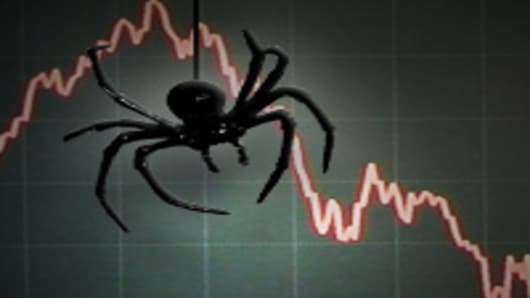The recent gyrations in global stock markets are just the beginning, says U.S.-based economist and author Harry Dent, who believes the Dow will fall below 10,000 in the near term before crashing to around 3,000 in 2013.
"I think the stock crash started in late April. This is just the first wave down...I think the crash really starts some time in early 2012," said the Founder and CEO of economic research company HS Dent and author of upcoming book "The Great Crash Ahead".
He pointed to the selloff during the last global financial crisis, when the Dow
lost around 8,000 points in the period between October 2007 and early 2009.
Dent based his bearish predictions squarely on the changing spending habits of global consumers.
"Baby boomers around the world, and all the developed countries — Europe, North America, Australia — they have peaked in their spending cycles...they've been driving up real estates prices and stock prices and the economy for decades, and now they're going to be saving and not borrowing," Dent said.
Accentuating the problem is the deleveraging of U.S. private debt, which has doubled to $42 trillion from $20 trillion in the last eight years, according to Dent, and is now valued at three times the size of the nation’s public debt.
"That debt is deleveraging, and that's actually causing deflationary trends. It won't matter how much stimulus the government throws at the system, because baby boomers with their already huge debt burdens will not want to borrow money and spend more,” said Dent.
"In the Great Depression, that's what happened — deflation came in such a deep downturn because so much debt was deleveraging."
According to Dent, the spending in the boom years has led to the biggest global real estate and credit bubble in history. He believes the worst hit will be those places where the bubble hasn't burst yet — West Canada, Australia and China.
"Bubbles go back to where they started," he noted. U.S. housing prices, he observed, have fallen 34 percent since their peak, and will drop by another 30 percent. "There's a lot more pain coming, especially in real estate," said Dent, who sold his home in Miami, Florida in October 2005, and doesn’t intend to buy property until the market bottoms in a few years.
The only solution to the crisis, Dent offers, is for policy-makers to intervene and write down debt.
"You can't deal with this crisis without dealing with the debt first because the demographics are not in your favor. So it's the only thing you can do, by writing down debt, you free up cash flow for consumers and businesses. It's the only thing you can do in a crisis like this after such a major debt and credit bubble.”
Avoid Gold, Silver; Buy Dollars
Contrary to what most analysts are recommending, Dent advises staying cautious on gold
and silver , and stocking up on U.S. dollars.
"I think gold and silver are a bubble. It's the most dangerous place to be," Dent said. “Gold's kind of a wild card, but what we notice it's gone parabolic. We've been telling people… to get out of gold at $2,000.”
He thinks silver has peaked at $50. “The last time silver went to $50, it crashed back to $4 within two years.”
As the deleveraging process takes place and most asset classes fall, Dent says the one asset that will return to its safe haven status will be the greenback,
"Debts get written off. That destroys dollars. It makes the dollars more scarce. It restores its value."
Correction: A previous version of the story incorrectly quoted Harry Dent as saying U.S. private debt was $42 billion. He actually said $42 trillion.


